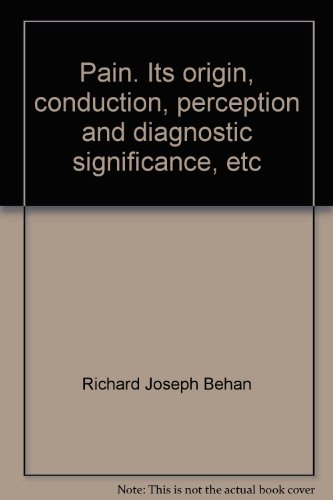
Pain, Its Origin, Conduction, Perception and Diagnostic Significance
by Richard J. Behan
Publisher: D. Appleton 1920
ISBN/ASIN: B000WG48L4
Number of pages: 970
Description:
Pain is universal, and is present in practically every disease, and in most diseases it is the one symptom which first attracts the patient's attention and causes him to become aware of some change in his physical well-being. The physician needs to know not only the various factors to which a certain pain may be due, but also the reasons why it should be produced and the different diseases giving rise to pain of similar character and location.
Download or read it online for free here:
Download link
(multiple formats)
Similar books
 Human Physiology
Human Physiology- Wikibooks
Human Physiology explains the workings of your body, it is intended as an undergraduate-level guide to the functios of the body systems at a cellular level, and explains how they work together to maintain a favorable environment for your cells.
(88144 views)
 Critical Care Physiology
Critical Care Physiologyby Robert H. Bartlett - MPublishing
This review of concepts in critical care physiology focuses on monitoring and management, with content limited to discussion of four topics in integrative physiology (oxygen kinetics, fluid and electrolytes, host defences and metabolism / nutrition).
(8270 views)
 New Human Physiology
New Human Physiologyby Poul-Erik Paulev - Copenhagen Medical Publishers
This is a textbook for students of medical physiology and a refresher for medical doctors. It integrates basic topics and the patho-physiological mechanisms governing human life. The book also contains clinical problems for students.
(19310 views)
 Practical Physiology
Practical Physiologyby Marcus Seymour Pembrey - Longmans, Green
Physiology is the basis of medicine. The medical student should undergo a training in practical physiology, for thereby he learns to observe, to draw conclusions from his observations, and to unravel the causes of his failures.
(15524 views)